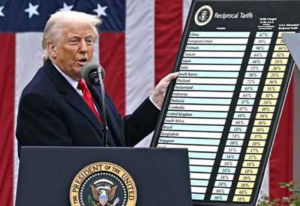
U.S. Trade Shake-up Hits Dozens of Countries Including Pakistan, India, and Brazil
WASHINGTON (Updated News Report) – In a bold move ahead of a key trade deal deadline, former U.S. President Donald Trump has imposed sweeping tariffs on imports from over 60 countries, including a 19% tariff on Pakistani goods, as part of a broader plan to reshape global trade.
According to a presidential executive order, the new tariff structure impacts many major economies:
-
Canada: 35%
-
Brazil: 50%
-
India: 25%
-
Taiwan: 20%
-
Pakistan: 19%
-
Switzerland: 39%
The tariffs will take effect seven days from now, applying to a wide range of goods. While some nations had limited talks with the U.S., many—like Pakistan—had no opportunity to negotiate before the decision.
Impact on Pakistan and Global Trade Relations
Pakistan, already facing economic headwinds, now faces increased pressure on its export sector, particularly textiles and consumer goods. Analysts warn this move could severely impact trade balance and increase prices for Pakistani exporters targeting the U.S. market.
The U.S. administration says this new structure aims to correct longstanding trade imbalances and support domestic industries. Trump also hinted at more trade deals in progress.
Exception Clauses and Country-Specific Decisions
While most of the new tariffs are across-the-board, Mexico received a 90-day exemption to allow further negotiation. Meanwhile, Canada’s fentanyl-linked goods now face a 35% tariff, a sharp increase from the earlier 25%, citing Canada’s failure to curb narcotics inflow.
India faces a 25% tariff, partly due to disagreements over agricultural access and concerns about India’s ongoing purchases of Russian oil. Trump’s move triggered political backlash in New Delhi and a dip in the Indian rupee.
Economic Concerns and Legal Pushback
The new tariffs come amid rising concerns over inflation in the U.S. Consumer goods prices surged in June, including a 1.3% rise in household furnishings and a 0.9% increase in recreational goods.
Trump invoked the 1977 International Emergency Economic Powers Act (IEEPA) to justify the sweeping tariffs. However, a U.S. federal appeals court recently questioned the legality of his use of emergency powers, raising doubts about the sustainability of this approach.
What Lies Ahead
With China facing an August 12 deadline to finalize a new tariff agreement with the U.S., global markets are watching closely. Trump claimed that several new trade deals are in the works but offered no further details.
Economists and political analysts warn that this could be the beginning of a more protectionist U.S. trade strategy, especially if Trump returns to power. For Pakistan and other affected nations, the path forward will likely involve intense diplomacy and economic adjustments.